
The arrival of 37 Gazan refugees on July 11 was followed by a violent altercation in Paris, fuelling public anxiety
France’s recent decision to grant automatic refugee status to Gazans has sparked intense debate across political, legal, and cultural spheres. The ruling by the National Court of Asylum (CNDA) on July 11, 2025, allows Palestinians from Gaza to qualify for asylum based solely on their nationality, citing systemic persecution by the Israeli military.
What the Ruling Means
- Legal Shift: Previously, Gazans were granted only subsidiary protection. Now, they are eligible for full refugee status, including a 10-year renewable residency permit, access to social services, and potential naturalization.
- Humanitarian Justification: The CNDA cited “acts of persecution of exceptional intensity” in Gaza, including widespread civilian casualties and collapse of basic services.
- Precedent-Setting: This marks the first time France has granted refugee status based on group identity rather than individual persecution claims.
The Political Firestorm
Supporters Say:
- It’s a moral and humanitarian response to a worsening crisis.
- Aligns with European legal standards under the Geneva Convention.
- Offers dignity and long-term protection to displaced Palestinians.
Critics Argue:
- It’s “migration madness” that could lead to uncontrolled influx of refugees.
- May include Hamas sympathizers, raising security concerns.
- Undermines democratic oversight, as courts not elected officials made the decision.
- Fuels fears of cultural fragmentation and Islamisation, especially among right-wing parties like Reconquête and Rassemblement National.
Islamisation Debate: Real Concern or Political Rhetoric?
The term “Islamisation” is often used in political discourse to describe perceived shifts in cultural identity due to Muslim immigration. In this case:
- Right-wing leaders like Éric Zemmour and Éric Ciotti warn that Gazan refugees may not integrate into French secular society and could bring religious conservatism or radical ideologies.
- Feminist activists have voiced concern about differing social norms and gender roles.
- Others argue that such fears are exaggerated, and that France’s secular framework is strong enough to absorb diversity without losing its identity.
Broader Implications
- EU Tensions: France’s move diverges from other EU countries like Germany and the Netherlands, which offer limited protection to Gazans.
- Diplomatic Fallout: The ruling may strain relations with Israel, as it implicitly recognizes persecution by the Israeli military.
- Domestic Impact: The arrival of 37 Gazan refugees on July 11 was followed by a violent altercation in Paris, fuelling public anxiety.
France: Leading the Shift
- Policy Change: France’s National Court of Asylum (CNDA) now grants full refugee status to Gazans based on group persecution.
- Rights Granted: 10-year renewable residency, access to social services, and path to naturalization.
- Legal Basis: Expanded interpretation of the 1951 Geneva Convention, citing “exceptional intensity” of persecution.
- Political Impact: Sparked fierce debate over migration, integration, and national identity.
Germany: Legal Limbo and Reversal
- Initial Freeze: Germany’s Federal Office for Migration and Refugees (BAMF) halted Gaza asylum applications in early 2024, citing “uncertainty”.
- Court Challenges: German courts ruled in favor of Palestinian applicants in 187 cases by April 2025.
- Policy Update: As of July 2025, BAMF resumed processing claims, acknowledging Gaza’s humanitarian crisis.
- Protection Level: Most Gazans still receive subsidiary protection, not full refugee status.
Netherlands & Others: Conservative Approach
- Limited Asylum: Countries like the Netherlands continue to offer subsidiary protection only.
- No Group-Based Recognition: Refugee status requires individual persecution claims, not nationality-based recognition.
- EU Legal Framework: Member states retain discretion under the Geneva Convention, but France’s move may pressure others to reconsider.
France’s Broader Asylum Reforms (2024–2025)
- New Law: The 2024 Immigration Law emphasizes integration, border control, and streamlined asylum procedures.
- France Asile Hubs: Centralized registration centers to simplify asylum applications.
- House Arrest & Detention: Expanded powers to detain asylum seekers deemed a threat to public order.
- Republican Contract: Applicants must pledge to uphold French values like secularism and gender equality.
What This Means for the EU
France’s bold legal shift has created a precedent that could reshape asylum norms across Europe. While some countries remain cautious, the humanitarian urgency in Gaza and legal pressure from courts may drive broader reforms.
Final Thoughts on Refugee status to Gazans
Whether this decision is a humanitarian milestone or a political misstep depends on one’s lens. It undeniably reflects France’s evolving stance on asylum and its willingness to challenge traditional norms. But it also exposes deep divisions over identity, integration, and national security.
The real test will be in how France manages the implementation, balancing compassion with caution, and ensuring that refugee protection does not come at the cost of social cohesion or public trust.
Stay updated with the latest news on Rapido Updates. Keep yourself updated with The World, India News, Entertainment, Market, Automobile, Gadgets, Sports, and many more
1 thought on “Refugee status to Gazans? France’s Bold Asylum Shift for Gaza”
Comments are closed.